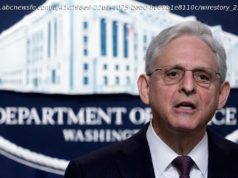In what amounts to a significant, albeit not surprising, change in Catholic doctrine, Pope Francis has declared that the death penalty is unacceptable in all
Pope Francis has announced what amounts to a significant, if seemingly inevitable, change in Catholic doctrine regarding the death penalty:
ROME — Pope Francis has declared that the death penalty is wrong in all cases, a definitive change in church teaching that is likely to challenge faithful Catholic politicians, judges and officials in the United States and other countries who have argued that their church was not entirely opposed to capital punishment.
Francis added the change to the Catechism of the Catholic Church, the book of doctrine which is taught to Catholic children worldwide and studied by adults in a church with 1.2 billion members.
Francis said executions are unacceptable in all cases because they are “an attack on the inviolability and dignity of the person,” the Vatican announced on Thursday.
The church also says it will work “with determination” for the abolition of capital punishment worldwide.
Francis’ decision is likely to put many American Catholic politicians in a difficult position, especially Catholic governors, like Greg Abbott of Texas and Pete Ricketts of Nebraska, who have presided over executions.
The move could also set off a backlash among American Catholic traditionalists who have already cast Francis as being dangerously inclined to change or compromise church teaching on other issues, like permitting communion for Catholics who have divorced and remarried without getting a church annulment.
On social media, some Catholics are asking whether the Vatican timed the announcement to deflect attention from the scandal over revelations that former cardinal Theodore McCarrick was allowed to climb the hierarchy despite accusations made to senior church officials that he was sexually abusing his seminary students.
The new teaching could also complicate the lives of American Catholic judges.
In a 2002 article, Justice Antonin Scalia, who died in 2016, said there was no tension between his support for the death penalty and his faith because “the latest version of the Catholic catechism does not purport to be binding teaching — that is, it need not be accepted by practicing Catholics, though they must give it thoughtful and respectful consideration.”
The new teaching appears to make the conflict much sharper, if not definitive.
President Trump’s nominee to the Supreme Court, Judge Brett M. Kavanaugh, is Catholic, as are Chief Justice John G. Roberts Jr. and Justices Clarence Thomas, Samuel A. Alito Jr. and Sonia Sotomayor. One of the other finalists for the vacancy created by the retirement of Justice Anthony M. Kennedy was Judge Amy Coney Barrett, who is also Catholic.
She wrote a 1998 law review article suggesting that Catholic judges should consider recusing themselves in some death penalty cases that might conflict with their religious beliefs.
Abolishing the death penalty has been one of Francis’ top priorities for many years, along with saving the environment and caring for immigrants and refugees. He mentioned it in his address to the American Congress on his trip to the United States in 2015, saying that “from the beginning of my ministry” he had been led “to advocate at different levels for the global abolition of the death penalty.”
He added, “I am convinced that this way is the best, since every life is sacred, every human person is endowed with an inalienable dignity, and society can only benefit from the rehabilitation of those convicted of crimes.”
The new teaching builds on the instructions of Francis’ two immediate predecessors.
“This didn’t come out of nowhere,” said John Thavis, a Vatican expert and author. “John Paul II and Benedict laid the ground work; he’s taking the next logical step.”
“I think this will be a big deal for the future of the death penalty in the world,” he added. “People who work with prisoners on death row will be thrilled, and I think this will become a banner social justice issue for the church.”
Previously, Church doctrine on the death penalty stated that it was considered generally unacceptable in nearly all circumstances but allowed for the possibility in those rare cases where not going forward with execution would allow an “unjust aggressor” to take more innocent lives. As the late Pope St. John Paul II noted at the time that this version of Church doctrine was revised more than twenty years ago, though, those circumstances were considered to be very rare, and perhaps non-existent due to the ability of most nations to securely detain someone convicted of even the most heinous forms of murder so that they are never able to harm another innocent person. Since that time both John Paul II and Francis’s immediate predecessor Benedict XVI have made it clear that the circumstances under which capital punishment was considered acceptable under Catholic doctrine were limited and that opposition to the practice should be considered the default position for Catholics notwithstanding the caveat contained in the previously announced doctrine. Today’s announcement, then simply serves to make clear something that has become an unstated assumption in the ensuing decades, that the death penalty is never acceptable under Catholic doctrine.
As Ed Morrisse y notes this change is likely to create some tension even among devout Catholics, especially here in the United States:
The removal of the previous technical opening will create tension and conflict among faithful Catholics who see the death penalty as a rare but necessary option. At least, it appears the Vatican has grown a bit more sensitive to this point after Francis suggested that support would be a mortal sin in his May 2017 homily. Crux reports that Cardinal Luis Ladaria, prefect for the Congregation for the Doctrine of the Faith, argued that this was not a change in doctrine but a development of its understanding, a sotto voce invitation for Catholics to find a way to embrace it:
According to Ladaria, the new formulation of the Catechism expresses “an authentic development of doctrine that is not in contradiction with the prior teachings of the Magisterium.”
He then explains that previous Church teaching with regards to the death penalty can be explained in a social context in which the penal sanctions were understood differently, and “had developed in an environment in which it was more difficult to guarantee that the criminal could not repeat his crime.”
Ladaria takes care to point out in his letter to bishops that both St. John Paul and Pope Emeritus Benedict XVI both wrote explicitly in favor of abolishing the death penalty as part of supporting a culture of life. Perhaps that will ease the jolt of this transition, but a number of faithful Catholics still support the death penalty for particularly inhumane and depraved behavior, and do so in good-faith reliance on previous teachings and specific points of scripture. Even if the “mortal sin” language has been dropped explicitly, it will hang in the air nonetheless with these changes to the catechism. These Catholics will find themselves having been separated from the church without having moved at all, a position of injustice if not mitigated properly in this process — even if in practice the church has been moving in this direction for decades.
To be fair, while there are many Catholics, including those who have considered themselves devout, who have continued to support capital punishment in at least some circumstances notwithstanding even the limited circumstances under which it was considered permissible prior to this change, it has been my experience that many of the most devout Catholics are as adamant in their opposition to the death penalty as they are in their opposition to abortion.
Home
United States
USA — Criminal Pope Francis Declares Capital Punishment Unacceptable In All Circumstances






